 Features
Features

Technology applications have dramatically changed the lives of farmers in the northern province of Sơn La, where most of the population lives off agriculture.
Lê Hương & Minh Phương
Technology applications have dramatically changed the lives of farmers in the northern province of Sơn La, where most of the population live off agriculture.
Thanks to the support of the Gender Responsive Equitable Agriculture and Tourism (GREAT) Programme funded by the Australian Government, hundreds of local farmers, especially ethnic minority women, have access to high-tech devices to save labour and improve their living standards.
GREAT has cooperated with its partners to ease local labour in planting and processing agricultural produce since the end of 2019 at local agricultural co-operatives including the Dũng Tiến Cooperative in Phiêng Luông Commune in Mộc Châu District, the Tân Xuân 269 Bamboo Cooperative in Tân Xuân Commune, and the Xuân Nha Bamboo Cooperative in Xuân Nha Commune, Vân Hồ District.
Automatic watering & fertilising
Looking at the cheerful face of Nguyễn Thị Tươi, the wife of Kim Văn Dũng, chairman of the Dũng Tiến Cooperative, few people could know that she works with her husband to take care of a 4,000sq.m vegetables garden.
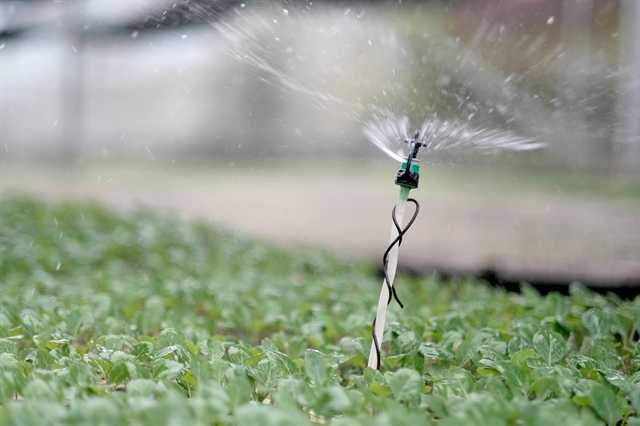
|
| Automatic watering system at Nguyễn Thị Tươi's garden. — VNS Photo Nguyễn Nam |
Her work burden has been eased with an automatic watering and fertilising system controlled by a mobile phone app.
“All I have to do now is touch the mobile app after getting information on the soil, humidity and air temperature from a monitor device attached in the garden to select the right water amount and turn on the valve,” she said.
“It’s so convenient and saves time. Since applying the system in 2019, I have had more time to take care of my family. I can do it anywhere, anytime I want. I even have time to join music shows and play volleyball with other women in the commune.”
The automatic system even helps distribute the water and fertiliser solution more evenly than by hand. Organic fertiliser is mixed with water in a tank before being pumped throughout the garden.
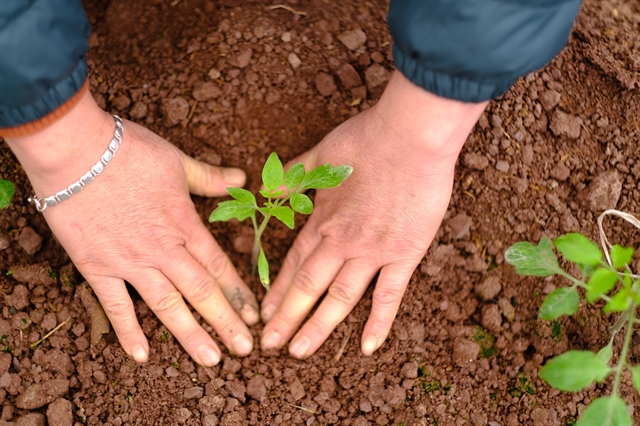
|
| The automatic system even helps distribute the water and fertiliser solution more evenly throughout the garden than by hand. — VNS Photo Nguyễn Nam |
Before, she needed two other people for the daily task to take care of the 4,000sq.m garden.
Dũng, her husband, appreciates that the automatic watering system saves labour for his family.
“My wife has got stronger and happier since I installed the system. Since 2019, GREAT has hosted various training classes for local farmers to understand 4.0 technology, apply scientific methods in planting and ensure gender equality,” he said.
“When using the automatic watering system, we maintain productivity while my family members get stronger as we have more time caring for one another and relaxing.”
Established in 2016 with seven members, the co-operative now has 18 household members cultivating a total of 10ha of land.
Each year, the co-operative produces 400 tonnes of cabbage, 150 tonnes of tomato, 100 tonnes of asparagus, and 80 tonnes of winter melon and pumpkin to supply mainly Hà Nội and neighbouring provinces such as Ninh Bình, Hà Nam and Nam Định.
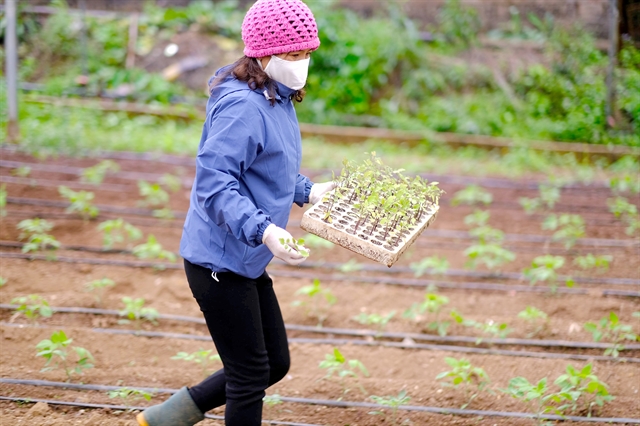
|
| Tươi’s work burden has been eased thanks to the new watering system. — VNS Photo Nguyễn Nam |
Planting vegetables brings an average income of VNĐ400 million per hectare to the cooperative members.
Dũng said from 2022 to 2025, the cooperative would maintain 2ha of organic vegetables in addition to VIETGAP standard quality area. The cooperative aims to increase the annual income to VNĐ600 million per hectare.
“Thanks to planting vegetables, our income has improved a lot,” said Bàn Văn Đông, a former local official.
“The whole appearance of the commune has also changed a lot. Big multi-storey houses have replaced worn-out houses. A few years ago, buffaloes wandered around the muddy road. Now cars are parked at many houses. Women are now much more confident to master technology and play an active role in planting.”
Solar energy dry-house
With support from GREAT, twelve people from the Xuân Nha Bamboo Cooperative in Vân Hồ District have benefitted from a solar energy dry-house.
Hà Thị Huế, deputy director of the cooperative, said the dry-house had saved a lot of energy, protected the environment, and ensured the good quality and colour of the products.
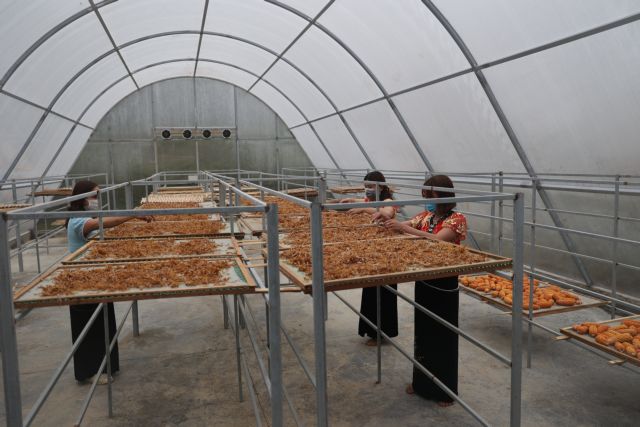
|
| Women work in the solar energy dry-house. — VNS Photo Nguyễn Nam |
“Before, fresh bamboo shoots were gathered and dried by burning firewood,” she said. “I had to degrade the forest to source the wood, then when we burnt the wood, the smoke harmed the environment and our health and the smoky smell stayed on the dried bamboo shoots. The dried bamboo shoots were also tainted with the smoke colour.”
The 100sq.m dry-house uses solar energy to dry up to 1.5 tonnes of fresh bamboo shoots in three days. Now they turn the shoots once or twice, compared to 10-15 times in the past.
From 1 tonne of fresh bamboo shoots, they get 80-100kg of dried product after three days.
“Using solar energy is cleaner for the environment, safer for our health, and results in better product quality,” she said.
The cooperative members obtain higher incomes whilst spending less time and energy at work since joining the programme in 2019.
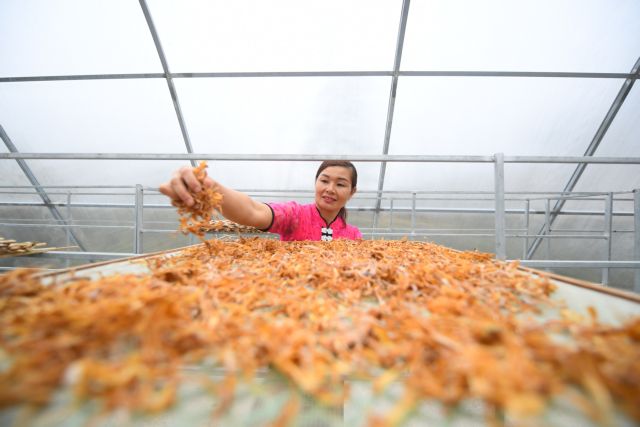
|
| Using solar energy is cleaner for the environment, safer for workers' health, and better product quality. — VNS Photo Nguyễn Nam |
Before joining the cooperative, their income was VNĐ10-20 million/per bamboo season. There are three bamboo seasons each year.
GREAT has helped them form working groups in the cooperative, supported training classes in harvesting bamboo shoots, co-invested in storage facilities and equipment including solar dry-houses, and held training classes in gender equality.
Each year, the cooperative produces over 20 tonnes of dried bamboo shoots to sell in the domestic market year-round. It also preserves sour bamboo shoots to export to Taiwan.
The Yên Thành Company in Yên Bái Province has signed a contract to buy the cooperative’s products for 20 years.
GREAT has introduced and co-invested in new technology to co-operatives including Tân Xuân 269 Cooperative run by Cao Thị Tâm in Tân Xuân Commune, also in Vân Hồ District. This includes drying cabinets, steamers and spin driers.
After the cooperative’s processing facility of 1,000sq.m was built in June 2020, the machines have facilitated the workers to process bamboo shoots and other agriculture products on a mass scale.
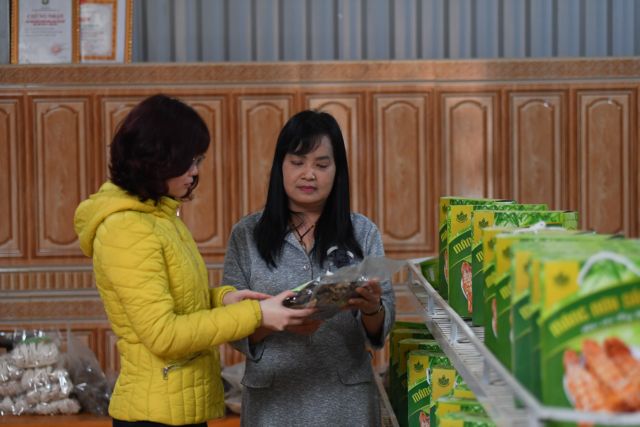
|
| Cao Thị Tâm (right) introduces her products to a customer. — VNS Photo Nguyễn Nam |
According to Cao Thị Tâm, director of the cooperative, previously members processed bamboo shoots at home with small ovens heated by firewood before having the machines.
“The old drying technique brought an uncertain quality in bamboo shoots,” Tâm said. “The products had a smoky smell which was not attractive. The productivity was not high. Each household could produce only 2-3kg of dried bamboo shoots a day.”
The drying cabinet can dry up to 500kg of fresh bamboo shoots in 10 hours, while the 700ml steamer and the spin drier can process the same amount. The work can be done every day, whatever the weather.
“Our dried bamboo shoots now look more attractive with a light yellow colour and fragrance of fresh shoots,” she said. “I’m now content with the productivity and quality of the products processed by the machines.”
With those machines, Tâm has trialled other products like banana and ginger, which have been accepted at supermarkets in Hà Nội.
Four years since its establishment, the 70-member cooperative now produces 30 tonnes of dried bamboo shoots each year from a total area of 1,000ha under bamboo plants. The main product of the cooperative has reached the national four-star OCOP (One Commune One Product) standard.
Last year, the cooperative had a total income of VNĐ3 billion, 30-35 per cent of which was profit, despite the pandemic. Each member gets a salary of VNĐ5-6 million per month.
Lê Anh Tuấn, GREAT's Inclusive Business Advisor, said the programme planned to prioritise agriculture innovation by upscaling successful models and solutions in the next phase.
“We will invest more in supporting enterprises and farmers to digitally transform,” he said.
“Digital technology can be applied more for certification, product origin registration, and online marketing to help enterprises run by women better access the market.”
Research institutes and universities will continue to be potential partners for GREAT in R&D and transferring technological solutions to farmers.
In the first phase between 2019 and 2021, VNĐ23 billion were spent on four trial technology models in two districts of Vân Hồ and Mộc Châu. This includes GREAT’s funding and co-investment from the benefitting enterprises.
As the programme goes from strength to strength, life looks great for Sơn La’s farmers. VNS
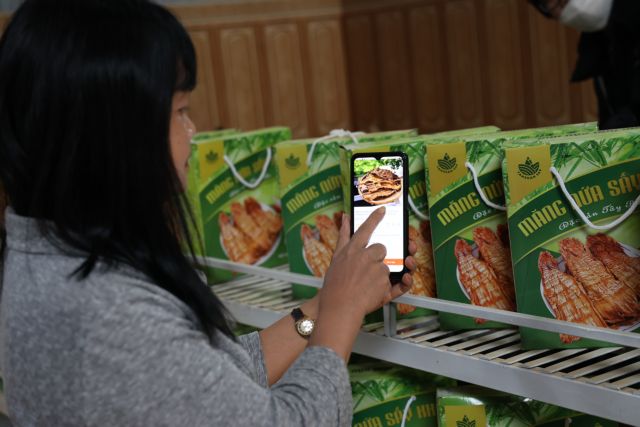
|
| Learning how to market products on digital platforms. — VNS Photo Nguyễn Nam |